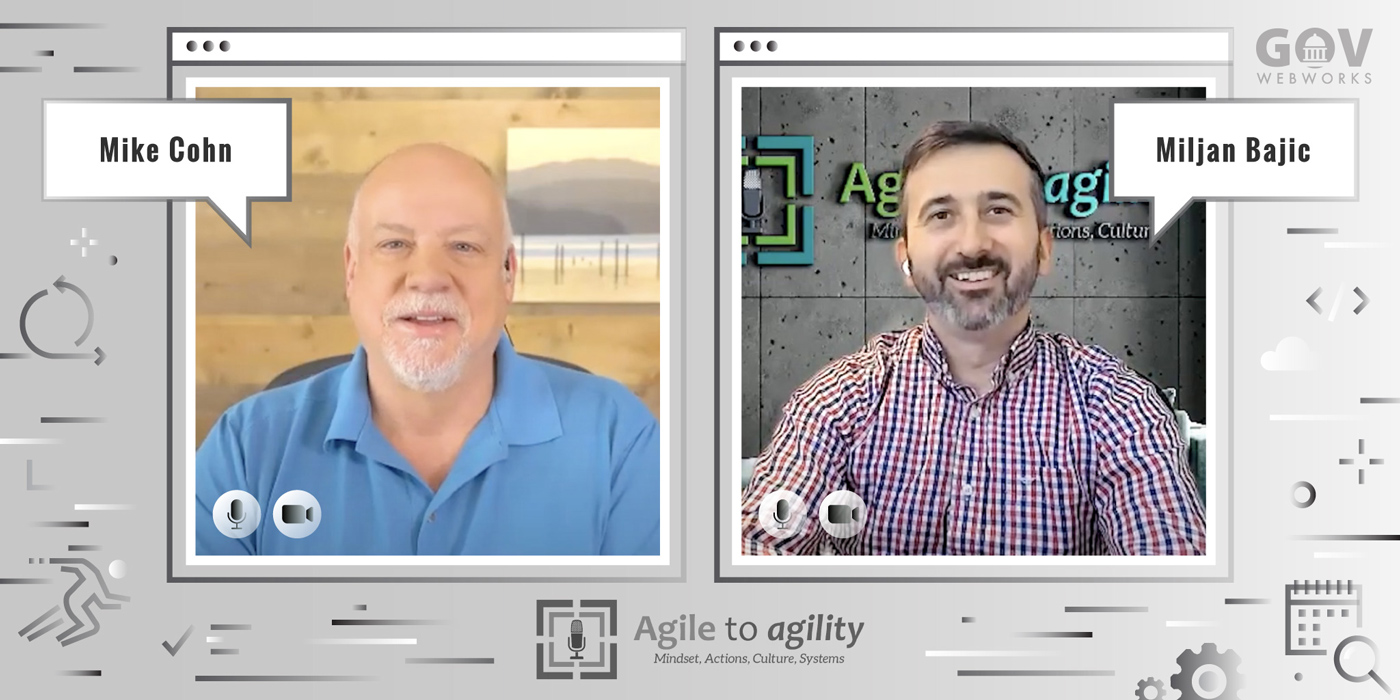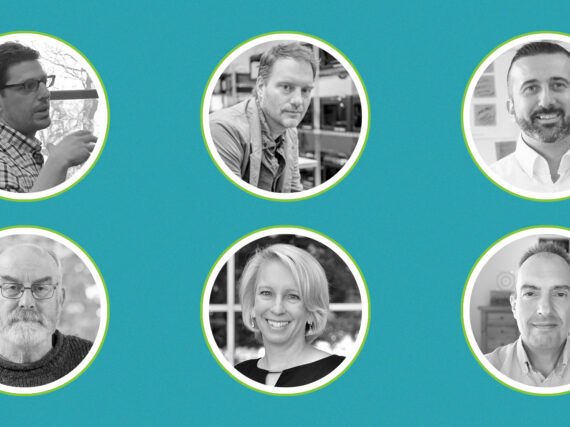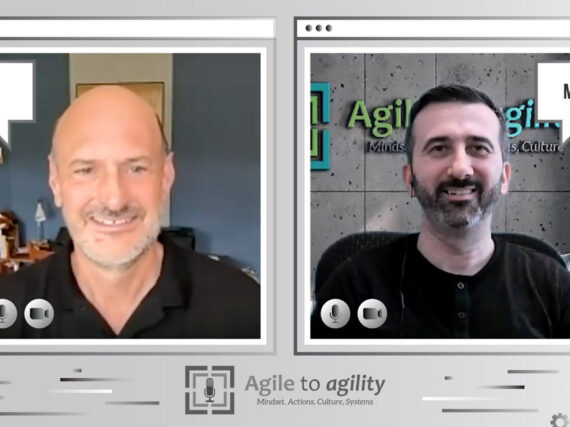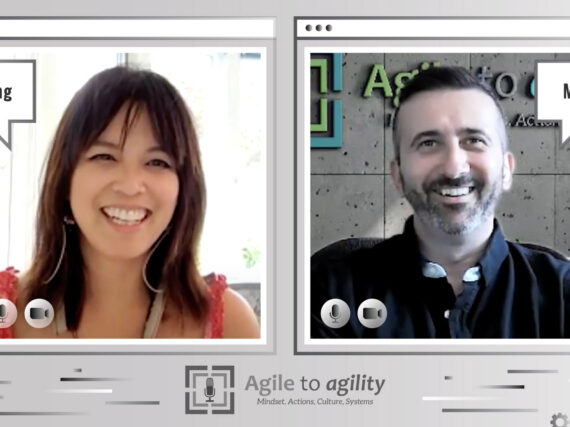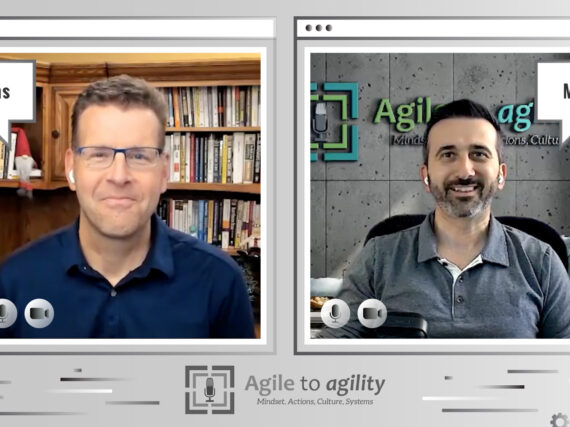Welcome to a new series of blogs based on the Agile to Agility podcast with Miljan Bajic. Each month, we’ll be highlighting topics from conversations between Bajic and experts in the field of Agile and Scrum. In this post, we have Bajic’s discussion with Mike Cohn of Mountain Goat Software. They talk about the ways Covid has transformed Agile consulting and Scrum certifications, Cohn’s approach to changing culture, and predictions on where Agile consulting is headed.
A former GovWebworks employee, Miljan Bajic is an Agile coach, trainer and mentor who has supported many organizations with their Agile transformations. He’s one of roughly 50 professionals in the world that holds both Certified Enterprise Coach (CEC) and Certified Scrum Trainer (CST) designations from Scrum Alliance. He coaches organizations, teams, and individuals to collaboratively design systems that combine Lean thinking and Agile approaches to deliver maximum organizational effectiveness.
As a Scrum advocate since 1995, Mike Cohn co-founded the Agile Alliance and Scrum Alliance, and is a popular instructor and coach. He’s also been a VP of development at four Agile companies and runs Mountain Goat Software, a consultant company that helps organizations to adopt and improve Agile processes. His books on Scrum and Agile include Succeeding with Agile and Agile Estimating and Planning.
How has Covid impacted your agile consulting business?
We were very lucky, in December of 2019 we set a goal to start an online non-certified course, so we were already going down this path when Covid hit in March of 2020. In January I had recorded my classes and took the bits where I lectured for five minutes or longer and turned them into videos. So when we switched our Scrum certification courses to an online hybrid model, we did the live stuff in Zoom, and all the lectures as videos. This way, I talk a lot during the interactive parts, but don’t have to do the lectures every time. We also put a big investment into a platform for doing online exercises and so we’re seeing people enjoy the courses quite a bit. I’m really happy about how it’s gone, but not really surprised that it’s worked out.
Why weren’t you surprised?
About eight or nine years ago, I tried doing a pure video course, with no live element. I gave people a test at the end, just a little optional thing to see how the course was doing, and gave it to four or five online courses and four or five in-person groups. The people watching the video did better on the test than the people in the live sessions. And so I’ve always believed in the power of that. If you didn’t get something, you can rewind without having to ask the instructor, “Can you explain that again?” because people get embarrassed by that. We were seeing better educational outcomes with the video courses, so when we moved to a hybrid live-online format plus videos, I fully expected people to do very well with it.
You’ve been a visionary in the past, what do you think is going to happen next?
I wish I could say I’m a visionary. I’ve been right about a few things, but I’ve also been wrong about things, and of course those are not the things people notice because they don’t stick.
Companies have learned that the live online Zoom classes work. I anticipate us doing some online courses and some in-person courses. That’s the future we’re preparing for and live courses should start up this summer or fall.
My bets are that as soon as companies get the chance, they are going to want people back in the office. It’s great what we can do online with video, but the Zoom fatigue thing is real, people get tired of it. I think the predictions about it being a hybrid world are true, companies are not going to make people come in every day, but two or three days a week instead of five. Instead of core hours that have been so popular, I think we’ll see more core days. One team on Monday, Tuesday, and Wednesday, the other on Thursday and Friday.
“Companies are not going to make people come in every day, but two or three days a week instead of five. Instead of core hours that have been so popular, I think we’ll see more core days.”
What are your thoughts on the state of agile in 2021, on the 20-year anniversary of the Agile Manifesto?
We’re seeing Agile moving outside of software development and IT projects. This brings about a watering down of what it means to be Agile. I’m a software guy, my business has software in the name, and I’m going to die happy if I know how to manage software projects well. We have figured out what you need to do to be agile, flexible, and nimble in a software setting, but I’m not that ambitious to know how to manage every type of project in the world.
When we see Agile in everything, and apply it in other areas in a company, we water it down a little because it cannot be as rigid in things that are hard to change. In construction it can’t be “a nightly build of your building.”
“So for any organization to be Agile, what does that mean? For a lot of companies it means be more responsive to customers than we used to be, be faster, be better than we were.”
Now that everybody wants to jump on the agile and Scrum bandwagon, what is the future of consulting and coaching?
There will always be room for independent and boutique consultancies. That’s never going to go away. What I think will go away is the emphasis on Agile. At some point, we just want this to be what people do. We don’t have to keep harping on being Agile, it’s “of course we should be Agile.” If you’re a consultant and you tell companies they have to be profitable, they say, “of course we do.” I want Agile to get in that category where you say you’ve got to be Agile, and they say, “of course, we’re working on that.”
“You will always be fighting to be more profitable, just like you will always be fighting to be more Agile, but you’re not going to bring in consultants just for that. That’s a guarantee. It just becomes how we do things at some point.”
What are your thoughts around changing culture?
As consultants, I don’t know that we can change culture, but we can evolve culture. For example, I can decide to go Keto and all of a sudden I’m only eating protein, that’s a change I can do overnight, but I can’t decide as a big company, tomorrow I’m agile. I can evolve my culture as a big company, but no consultant can go in and just change it. It has to be a longer term commitment that has to evolve over years to get to where you want to be.
One of the things I try to do with clients is scare them away. I tell them all the hard things they have to do and why they’re not up for it. I say, “I’m not sure you really want to commit to this.” What I find is if they argue back with me, and say “no, we are willing to do that,” now I’ve got them hooked and they are willing to make the hard change. But if they go, “yeah, you’re right,” I just saved them a ton of money on a failed transition.
It reminds me of a romantic comedy where the girl breaks up with a guy who was going to break up with her, but she broke up with him first. As soon as she does, now he wants her. That’s just human nature, you dumped me, now I want you back. It’s the same thing with Agile, you go in and tell the company they’re not right for Agile, and if they start arguing, “yes, they are,” now you’ve got one that will do the hard work.
How do you define culture?
Culture is how people behave when they are not getting evaluated or honored. Will I do the right thing for our customers even if my boss will never know I did the right thing for our customer? As an example, my wife and I bought a new dishwasher, and had it installed, and then that night it wouldn’t start. It was 6:30pm, so we called the appliance store expecting to leave a message but we got a salesperson who said, “you are on my way home, I’ll stop on my way home and fix it.” I made sure to let the company know, but that guy did the right thing with no expectation that his boss would ever know. That’s an amazing culture. You can say you are customer centric all you want, but that’s a company that’s living it.
What’s more important, values or practices?
Every conference in the early days talked about values versus practices, the so-called Karate Kid conversations. Can you be Agile if you don’t know the values, but you go through the motions long enough?
In the end, I say, get rid of the methodologies and reassemble them the way you want to do it. Do what’s right for you, whether it’s Scrum or not, who cares, as long as you’re making good teams and good projects.
Learn more
Listen to the full podcast:
Check out the Digital Transformation series with Miljan Bajic on our blog:
- Making Sense of Digital Transformation: What does it mean? And how does it work for the public sector?
Get Scrum certified:
Attend an Agile event:
